
Guests
- Andy Worthingtonis a U.K.-based journalist. He is author of the book The Guantánamo Files: The Stories of the 774 Detainees in America’s Illegal Prison and the co-founder of the Close Guantánamo campaign.
- Frank Goldsmitha civil rights attorney who represents recently released Guantánamo detainee Khairullah Khairkhwa.
The Obama administration is defending its controversial prisoner swap deal that saw five members of Taliban released from the Guantánamo Bay prison in exchange for the release of U.S. Sgt. Bowe Bergdahl by the Taliban. On Thursday, State Department deputy spokeswoman Marie Harf disputed some Republicans’ claims that the released detainees were the “worst of the worst.” We speak to civil rights attorney Frank Goldsmith, who represents one of the freed Guantánamo prisoners, Khairullah Khairkhwa. We also speak to reporter Andy Worthington, who recently wrote an article called “Missing the Point on the Guantánamo Taliban Prisoner Swap and the Release of Bowe Bergdahl.”
Transcript
JUAN GONZÁLEZ: The Obama administration is defending its controversial prisoner swap deal that saw five Taliban militants released from the Guantánamo Bay prison in exchange for the release of Sergeant Bowe Bergdahl by the Taliban. On Thursday, State Department spokesperson Marie Harf disputed claims that the five released men were, quote, “the worst of the worst.”
MARIE HARF: When I would say these five aren’t the worst of the worst.
REPORTER: You stand by that: They’re not the worst of the worst.
MARIE HARF: Doesn’t mean they’re good guys. I am in no way—it’s not my job to get up here and defend them. I think—and look, they were mid- to high-level officials in an incredibly repressive, violent regime. And it’s because—that’s why they were brought to Guantánamo, not because of their ties to al-Qaeda. Some of them may have had some, but because of their role in the Taliban, very early on in the war.
REPORTER: So it’s not your—
MARIE HARF: But that doesn’t mean they directly threaten the United States’ national security. We feel like we’ve sufficiently mitigated that.
AMY GOODMAN: The prisoner swap deal has come under harsh criticism from Republicans like Senator John McCain of Arizona. On Wednesday, he suggested the releasing of the five Guantánamo prisoners puts the U.S. military at risk.
SEN. JOHN McCAIN: These people have dedicated their lives to destroying us. These people have dedicated their very existence. Why do you think that when the judgment was made, that if they release them, it would pose a great risk to the United States of America?
AMY GOODMAN: For more, we’re joined now by the attorney for one of the recently released Guantánamo prisoners. Civil rights attorney Frank Goldsmith represents Khairullah Khairkhwa, and he joins us by Democracy Now! video stream. In London, we’re joined by journalist Andy Worthington, who recently wrote a piece called “Missing the Point on the Guantánamo Taliban Prisoner Swap and the Release of Bowe Bergdahl.” He’s also the author of The Guantanamo Files: The Stories of the 774 Detainees in America’s Illegal Prison and co-founder of the Close Guantánamo campaign.
We welcome you both to Democracy Now! Frank Goldsmith, tell us about your client at Guantánamo who has just been released to Qatar.
FRANK GOLDSMITH: Mr. Khairkhwa was a political official in the Taliban administration when it was the governing administration of his country. He served in several roles. He was a press spokesman. He was acting minister of the interior. And later, he was governor of the province of Herat in western Afghanistan. That’s what I can tell you about his official role. That’s what is public knowledge about him.
AMY GOODMAN: And how long has he been held at Guantánamo?
FRANK GOLDSMITH: He has been held there for over a dozen years. He arrived in early 2002 and has, as you know, just been released.
JUAN GONZÁLEZ: How was he originally captured by the U.S. military?
FRANK GOLDSMITH: He wasn’t captured by the U.S. military. As is the case with most of the 779 men who have passed through Guantánamo, he was captured by forces other than U.S. forces—in this case, Pakistani forces. They raided a home of another man. Mr. Khairkhwa happened to be a guest in that home, and he was arrested, I think, because of the prominence of his role in the government of Afghanistan.
JUAN GONZÁLEZ: So, in this case—and this happens often, unfortunately, among the American media here—there’s no distinction virtually made between al-Qaeda fighters, Taliban officials or even Taliban military people. So you’re essentially saying that his role was largely a political role within the Taliban government.
FRANK GOLDSMITH: That’s correct. He did have a political role. The other thing to know about Mr. Khairkhwa is this. His return was sought by the government of Afghanistan because he was viewed as a very moderate person, although he was a member of the Taliban. He had skills as a mediator, a person able to resolve disputes between opposing factions. We have a letter from the High Peace Council of the government of Afghanistan dated in February 2011 that we turned over to the U.S. government, in which that High Peace Council called for his return to Afghanistan to aid in the peace process. That was also endorsed by President Karzai. We also presented testimony from a man named Hekmat Karzai, who had investigated Mr. Khairkhwa and knew about his role as a peacemaker and as a moderate person, and presented that, as well, in the litigation to try to secure his release.
AMY GOODMAN: I wanted to go to Colonel Morris Davis, who we spoke to on Tuesday on Democracy Now!, the former chief military prosecutor at Guantánamo Bay.
AMY GOODMAN: Would you call these men who have been released and sent to Qatar prisoners of war, as well?
COL. MORRIS DAVIS: Yes. It was disappointing hearing—not just Senator Cruz, there have been many, John McCain and others, that have tried to use this as political capital to make President Obama look weak. And I think that’s a false narrative, and, unfortunately, too many of the public buy into it.
AMY GOODMAN: That is Colonel Morris Davis, the former chief military prosecutor at Guantánamo Bay. I wanted to bring in Andy Worthington to comment on this, the British-based journalist who wrote the piece that’s headlined “Missing the Point on the Guantánamo Taliban Prisoner Swap and the Release of Bowe Bergdahl.” Your response, Andy?
ANDY WORTHINGTON: Well, the main thing that I think about this prisoner release is—you know, is what Jack Goldsmith said, who was a legal adviser to the Bush administration, who said that, you know, all that President Obama has done with this prisoner swap is to deal a few months in advance with something that’s coming very soon. The drawdown of U.S. troops is going to make it untenable, legally untenable, to carry on holding Taliban prisoners. So, you know, we’ve seen a lot of—we’re seeing a lot of hysteria about nothing, essentially—very opportunistic political maneuvering. And I just don’t see it.
I think, clearly, these are people who had a role within the Taliban. People may not like what some of them did. We certainly have allegations against a couple of these men of being involved in military—possibly military atrocities in Afghanistan, but not in connection with the United States.
And what we’re not hearing from all of these critics is a genuine understanding and honest appreciation of what happens when you’re winding down a war, when, you know, negotiations and discussions are going to take place between the parties. And that’s exactly what’s been happening with the exchange of these—the prisoner exchange here. It’s got the U.S. soldier back, as the U.S. always says it wants to do, and it is also dealing with the process of winding down the conflict in Afghanistan. The criticism is coming from people who want all of this to go on forever. They want Guantánamo to go on forever. They want the war to go on forever.
JUAN GONZÁLEZ: Well, Andy Worthington, about that specific issue of the winding down of the war, The Washington Post had an interesting background story yesterday where it talked about debates within the administration that have been going on now for two years on this prisoner swap, and basically that the administration was also seeing that as the war winds down, their ability to be able to get Bergdahl freed was also diminishing, so that they—the only difference was that a year or two ago it was six Taliban leaders that the Taliban were requesting, so they reduced it to five. But essentially, this has been the swap that’s been talked about now for quite some time, and yet it’s now—Congress is acting as if it’s a total surprise.
ANDY WORTHINGTON: No, absolutely, and it certainly is not surprising to them. That’s fundamentally dishonest. And I honestly can’t see any reason why people should be disputing the statements made by the administration, that they’ve seen the videos of Bowe Bergdahl, that they were extremely concerned about his health, and that’s why they’ve moved on this so swiftly and also why they didn’t bring Congress into the loop when the legislation supposedly requires 30 days’ notice to be given. I fundamentally think that it’s dishonest, again, of lawmakers and of media pundits to be saying that the president broke the law, when it’s very clear why he did it. And he did that for very sound and practical reasons.
AMY GOODMAN: At a news conference Wednesday, a journalist asked deputy spokesperson Marie Harf, who qualifies—”Who qualifies as a prisoner of war?”
REPORTER 1: You have consistently referred to Mr. Bergdahl as a prisoner of war. Who decides who is a prisoner of war and who is not a prisoner of war?
MARIE HARF: What do you mean, who decides?
REPORTER 1: Well, the U.S. government—
MARIE HARF: I mean, he was an American serviceman taken by the enemy in armed conflict that we’re operating under an AUMF.
REPORTER 1: Right, I get that. But the people who are imprisoned at Guantánamo Bay were—although they could, by some people, be construed to be prisoners of war, and some of them were indeed taken on the battlefield in the course of a military conflict, they were deemed by the United States government not to be prisoners of war. They were very carefully defined to be enemy combatants, I think the historical record shows, so as to be able to strip them of the right—
MARIE HARF: Well—
REPORTER 1: Let me finish—the rights that would have been granted to or afforded, exactly, prisoners of war. So, you guys can call—you say that Sergeant Bergdahl was a prisoner of war, but maybe from the Taliban’s point of view he was not a prisoner of war.
REPORTER 2: He was just swept up on the battlefield in Afghanistan—
MARIE HARF: Yeah, but can I—can I make a few comments, though?
REPORTER 2: —just like the Taliban, right?
MARIE HARF: Whether or not members of the Taliban meet particular prisoner of war criteria, including, I think, that it has to be between states—the prisoner of war term, I believe, in the Geneva Convention, refers to conflicts between states. Obviously the Taliban is not a state.
AMY GOODMAN: That is State Department spokesperson Marie Harf. Andy Worthington, I’d like to ask you to respond. And then, Frank Goldsmith, tell us what is happening with your client, who is now in Qatar. Andy first.
ANDY WORTHINGTON: Well, you know, the Taliban was the government of Afghanistan, so that’s a ridiculous thing to say. You know, it’s fudging, absolutely fudging the issue of the fact that the United States has been holding soldiers at Guantánamo—the majority of the men who have been held there, I think, would fit that category—and refused, from the beginning, to give them rights under the Geneva Conventions as prisoners of war. They were enemy combatants, of course, intended to have no rights whatsoever under the Bush administration. And all that’s happened under Obama is that they dropped the term “enemy combatant.” It was toxic. But they never explained exactly what they were replacing it with. These men have still been held in this dangerous limbo ever since. And what we’re seeing with the drawdown in Afghanistan that’s coming is that it’s going to be seen that actually the majority of these people held there were involved with the Taliban, and therefore they actually were soldiers and should have been prisoners of war.
What I’m interested in is how the administration is going to look at a lot of the prisoners held in Guantánamo who were with the Taliban in some way—they were either fighting with them or supporting them in other ways in Afghanistan; these are people who were not Afghans—and whether they’re going concede, finally, that these people were soldiers, or whether they’re going to insist that because there were cases where they were at camps where Osama bin Laden came and gave them a talk every now and then, that makes them al-Qaeda. It’s always been a lie that the majority of the prisoners were involved in terrorism in any way, I believe. And, you know, I’m hoping that what this is going to do—and I’m hoping that the hysteria at present is going to die down—is that we are going to address that issue, and we’re going to say, “Hey, we’ve been holding soldiers for all this time, and we didn’t give them the rights we should.” The conflict is coming to an end. They’ve got to go home.
AMY GOODMAN: We’re going to leave it there, but we’re going to pick up this conversation next week. Andy Worthington, British journalist who recently wrote the piece “Missing the Point on the Guantánamo Taliban Prisoner Swap and the Release of Bowe Bergdahl.” His book is called The Guantanamo Files, and we’ll link to the article at democracynow.org. And thanks so much, Frank Goldsmith, for joining us, representing one of the prisoners, Khairullah Khairkhwa, who is now in Qatar.

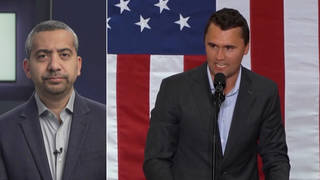
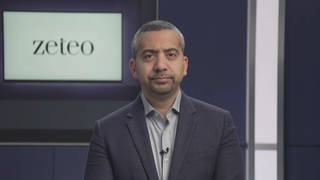
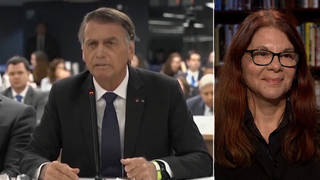
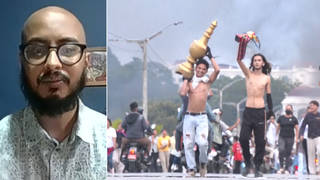





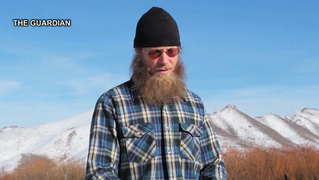

Media Options